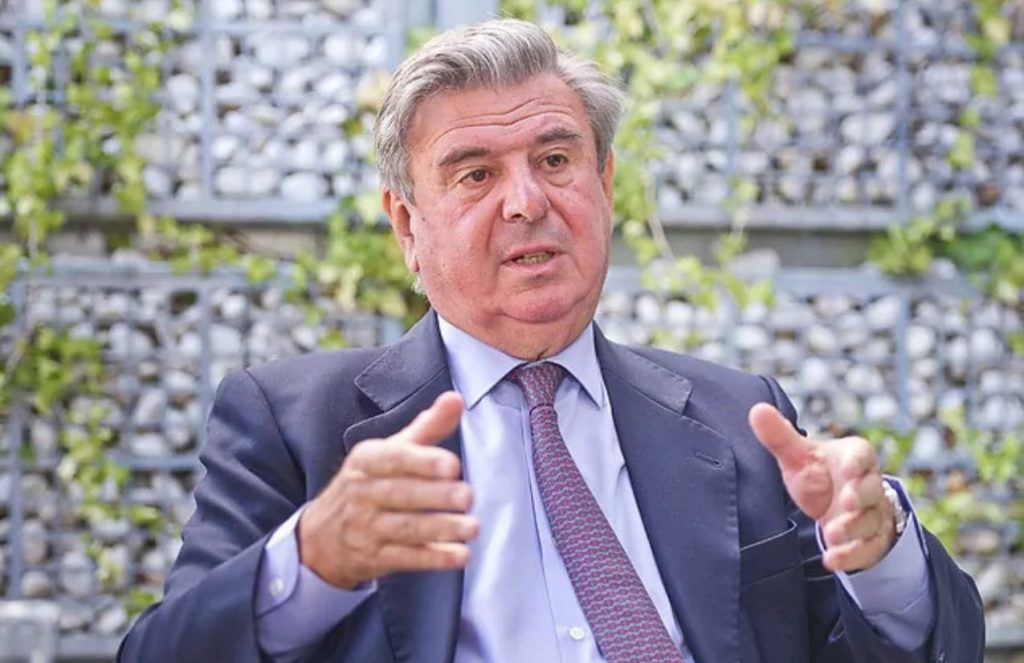Spain's former ambassador to London warns of the risk of failing to invest the Next Generation grants in time. 'The clock is ticking', he points out.
Last February, Carlos Bastarreche Sagües (Madrid, 1950), left his post as ambassador in London after a long career in diplomacy, which had previously taken him to Brussels and Paris, with an interlude as a manager at Airbus. The rest period after the Brexit negotiations was short-lived, as in May the Spanish Banking Association (AEB) and CECA offered him the position of senior advisor for European affairs.
'They tell me that I am the first person in history to have a business card with the logos of the AEB and CECA', says Bastarreche in an interview with Expansión. His primary mission is to help structure the role of the financial sector in the deployment of the €140 billion that Spain is entitled to under the Next Generation European funds scheme.
Why did the banking sector associations recruit you as an advisor?
The AEB and CECA collaborate on many issues, more than people think, and in the current context they thought it might be useful to have someone with experience in European and Spanish public administration to better understand the role of banking in European funds. In addition, know long ago to José María Roldán and José María Méndez [ AEB'S chairman and CECA's Managing Director, respectively ], who contacted me and here am.
And are you already clear about the role of banking in the Next Generation Plan?
The role of the sector is fundamental and essential for the funds to have a multiplier effect and allow investments of more than 500 billion to be deployed. Without the banks, funds cannot reach SMEs, families and the self-employed, as it is the sector with the greatest capillarity, with all types of customers everywhere. Moreover, the sector's own business consists of analysing risks and providing credit, which will allow it to anticipate and co-finance the grants that the government allocates.
Some people may believe that the only interest that motivates the banks here is to make money from the European funds.
The reality is that the direct benefits to banks' bottom lines will be irrelevant, as was already the case with the ICO lines to combat the pandemic, which were a huge success. Financial institutions have a genuine interest in making the funds a success for two other reasons as well. Firstly, it allows them to provide a new service to their customers by helping them receive and use the grants, something that will strengthen their solvency. And secondly, if the targets are met, the funds can boost Spanish GDP by 1.5 to 2 percentage points. The improvement of the economy is positive for banks, in that Spain is their customer.
However, the grant allocation process seems to be slow and the positive impact on GDP is starting to be revised downwards, at least this year.
As Michel Barnier [former European commissioner responsible for negotiating Brexit] would say, the clock is ticking and there is no time to lose. There is concern because the clock is ticking and the publication of the rules and allocation processes need to be accelerated, as funds need to be committed by 2023, and used by 2026.
And how can this process be accelerated?
The year 2021 is being a year's transition, but 2022 will be a critical year to launch real the development of the funds. There is no secret to this; it is necessary to speed up the publication of the corresponding decrees and endow the granting of these funds with a high degree of transparency in order to encourage demand. In fact, unlike what happened with the ICO lines after the pandemic, in this case it is necessary to generate demand for the funds, as in many cases there is no urgent need for companies or individuals to solicit these funds.
Do you feel that the government is in a hurry to meet these deadlines?
I see the administration's desire to meet the deadline, and they are aware of the need to speed up the process.
It seems that large companies have an advantage and are the most prepared to request these funds. There is room for everyone in the funds. There are programmes that need a large business tractora, as when is invested in building a factory of electric cars, and that you can filter to all the economy via the suppliers. But there are other plans, such as those promoting the refurbishment of housing, plans for the purchase of electric cars and grants for the digitalisation of SMEs, where it is necessary to launch incentives for people to request these funds.
Can banks help these small customers access the funds?
Another advantage of banking is that it is highly digitalised and all banks already have computer programmes in place to detect which calls for grants are most appropriate or can be best matched to their customers. This is something no other sector can offer. One of the objectives of the plan is to improve the demography of Spanish business by facilitating the growth of SMEs, as the current weight of companies with less than 50 employees is higher than in the rest of Europe. It is a strategic objective and banking can help meet it.
Does the latest decree on the refurbishment of housing send the right signals?
We need to see its implementation, but in principle it is positive. In addition to direct grants, a line of ICO guarantees is envisaged and the figure of the refurbishment agent is created, who can help homeowners' associations mobilise, complete the procedures and gain access to the subsidies. In fact, it might make sense to set up agreements or consortia between financial institutions and construction companies to create such agents. It should be borne in mind that 30,000 homes are currently being refurbished in Spain every year, and the medium-term objective of the plan would be to reach 300,000.













